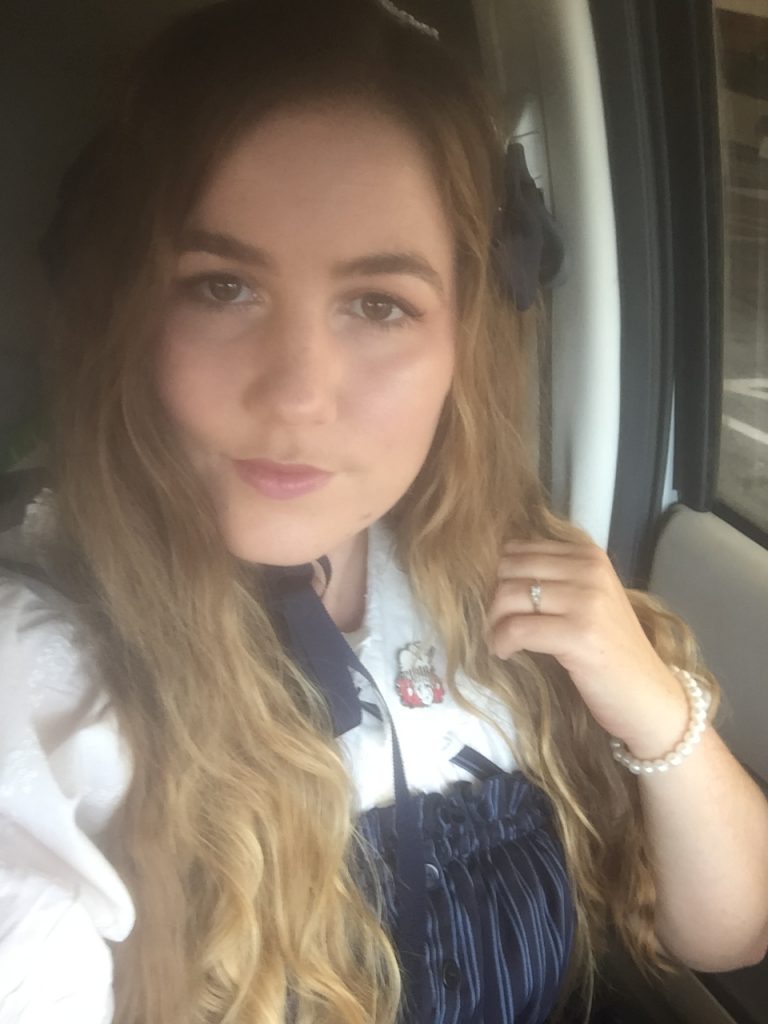The oral tradition of lolita fashion is almost as fun as wearing the fashion. Early lolita is best archived in the memories of the people who wore it.
But how do our perceptions of the past stack up to the real deal? Without a time machine it’s impossible to know for sure. Magazines, like the Gothic and Lolita Bible (GLB) and street snaps offer some idea of what people wore, but these pieces of media were never really intended to last. However, we are lucky that many people attempt to preserve the ephemeral history of lolita fashion. Projects like Lolita History feature an archive of j-fashion magazines, lovingly scanned and uploaded to the internet for anyone to view.
Method

Armed with Lolita History as a resource, I looked at the first issue of the GLB. I cataloged each person wearing what could reasonably be classified as lolita. I marked what the head piece was, how many there were in the picture, and whether or not it was a street snap.
First, some caveats. The GLB issue is from 2001, definitely in the time period that we call “old school”. However, much of this issue is devoted to brand photo shoots. Additionally, dozens of pages featured illustrations or photos of items for sale by brands. Ads don’t necessarily reflect what people are actually wearing. Furthermore, the Gothic and Lolita Bible featured things that were gothic and not lolita, so some of these outfits wouldn’t follow the “rules” of lolita anyway.
Nevertheless, the first issue of the GLB offers an interesting glimpse into what “old school” actually means.
Discussion
Because I’m a relative newcomer to the fashion, I decided to ask other people about their ideas about old school accessories. In a very scientific Instagram poll, 12 brave souls answered the question: “What is the most old school head accessory?” 9 people answered some variation of “rectangle headdress” or “maxi pad headdress”. 2 people answered soft bonnet, 1 person answered none, and one person did not read the question and answered “long bloomers” (definitely old school, but not helpful in this discussion).
The rectange headdress is definitely the first head accessory I thought of when I embarked on this project. Even within this answer though, I got a surprise. The answer that I shared in my story to represent these 9 answered specifically said “headdress tied under the chin”. This response got a very spirited discussion going about the best way to wear a rectangle headdress with ties. In a second unscienitific poll, more than 40 people answered the question, “A rectangle headdress ties a) under the chin or b) behind the head/hair.” The majority answered behind the head/hair, and many people messaged to me speak about their reasoning. Some people found ties under the chin uncomfortable while others find the style unflattering. One person wrote to tell me that in the 1990s and 2000s, “old school” lolitas in western community had debates about this style, noting that tying under the chin could make the wearer look like they had a turkey wattle. It’s hard to unsee the kawaii wattle.

Results
And then there were none….
Rectangle Headdress
Less surprising was one of the iconic old school accessories: the maxi pad headdress. 19 coordinates or ads had a maxi pad headdress. This included most of the images of Mana in this issue (though these were sometimes hard to see because his hair and the headdress were both black). Representing 30% of the head pieces in this issue, the maxi pad headdress will definitely scream “old school.” It’s also an accessory that is pretty unique to lolita fashion.
Bonnets
Though at least one person in my unscientific Instagram poll mentioned “soft bonnets” as an old school staple, there was only one that I could identify. I’m not sure if this is a matter of the GLB not capturing what people are wearing, or if brands just weren’t making them for this issue. I also only saw one hard bonnet. Either way, bonnets did not appear very much.
Flower power
Round canotiers, flower crowns, knit beanies, and other floral clips appeared several times each. Flower crowns definitely remain an option, thought they’ve somewhat fallen out of favor after OTT classic fell out of style. One of the street snaps featured a knit, fuzzy beanie, but it’s hard to imagine anyone attempting that in modern lolita.
Top hats
Finally, the most shocking piece of information that I picked up from my research was the prevalence of top hats in this issue of GLB. There were 5 top hats throughout the issue, including one in an ad for clothes from Victorian Maiden. This accessory accounted for 8% of the head pieces in this issue.

Very interesting. Part of me is tempted to take all GLBs from one year (2002 might be better since by then we definitely have a full year worth of GLBs) and see how this looked across a period of 12 months for a clearer picture. Though what you extracted out of GLB vol. 1 strikes me as pretty accurate, even though I don\’t have much interest in oldschool myself.
I think doing a whole year (or even the same time period over multiple magazines) would be a really great idea! I’ll admit though, that going through 70+ pages of just one issue was more work than I anticipated. Maybe you could enlist a few people to help and compile the data everyone finds?